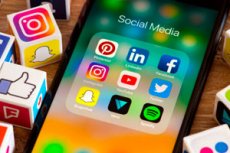Nye publikasjoner
Sosiale medier har blitt knyttet til mareritt, psykisk helse og søvnkvalitet
Sist anmeldt: 02.07.2025

Alt iLive-innhold blir gjennomgått med medisin eller faktisk kontrollert for å sikre så mye faktuell nøyaktighet som mulig.
Vi har strenge retningslinjer for innkjøp og kun kobling til anerkjente medieområder, akademiske forskningsinstitusjoner og, når det er mulig, medisinsk peer-evaluerte studier. Merk at tallene i parenteser ([1], [2], etc.) er klikkbare koblinger til disse studiene.
Hvis du føler at noe av innholdet vårt er unøyaktig, utdatert eller ellers tvilsomt, velg det og trykk Ctrl + Enter.

Jo mer tid du bruker på sosiale medier, desto mer sannsynlig er det at du har negative drømmer relatert til sosiale medier som forårsaker angst, forstyrrer søvnen og påvirker sinnsroen vår.
Reza Shabahang fra Flinders University argumenterer for at den enorme og raske spredningen av sosiale medier kan påvirke ulike aspekter av livet, inkludert drømmenes rike.
«Etter hvert som sosiale medier blir stadig mer sammenflettet med livene våre, strekker innflytelsen deres seg utover det våkne livet og kan påvirke drømmene våre», sier Shabahang, ved College of Education, Psychology and Social Work.
Shabahang utviklet en ny skala, Social Media Nightmare-Related Scale (SMNS), som kan tallfeste hvordan sosiale medier kan bidra til mareritt.
SMNS-skalaen ble utviklet ved å integrere litteratur om drømmer, mareritt og forholdet mellom media og drømmer, med vekt på spesifikke temaer knyttet til bruk av sosiale medier, som hjelpeløshet, tap av kontroll og viktimisering.
Artikkelen «Mareritt relatert til sosiale medier: en mulig forklaring på dårlig søvnkvalitet og lavt emosjonelt velvære i sosiale mediers æra?» ble publisert i tidsskriftet BMC Psychology.
«Studien vår introduserer konseptet med mareritt relatert til sosiale medier, som defineres som mareritt som inkluderer temaer relatert til sosiale medier som nettmobbing, netthat eller overdreven bruk av sosiale medier», sier Shabahang.
«Selv om mareritt relatert til sosiale medier er relativt sjeldne, er det mer sannsynlig at de som bruker sosiale medier oftere i hverdagen opplever slike mareritt, som er forbundet med negative psykiske helseutfall som angst, depresjon og søvnkvalitet.»
«Denne studien gir innsikt i de komplekse sammenhengene mellom bruk av sosiale medier, mental helse og søvnkvalitet», legger han til.
Shabahang advarer om at etter hvert som det teknologiske landskapet utvikler seg, er det behov for å fortsette å forske på virkningen sosiale medier har på brukernes drømmeopplevelser.
«Med den raske utviklingen av teknologi og media, inkludert kunstig intelligens (KI) og virtuell virkelighet, og den økende avhengigheten av og dype integrasjonen av disse teknologiene, kan vi forvente at drømmer med teknologisk og medieinnhold vil bli stadig mer vanlige», sier han.
«Fremtidig forskning har potensial til å utvide omfanget av denne studien ved å fordype seg i områder som mareritt knyttet til oppfattede AI-farer.»
«For å redusere forekomsten av mareritt på sosiale medier, anbefaler vi å bruke sosiale medier ansvarlig og bevisst», legger han til.
